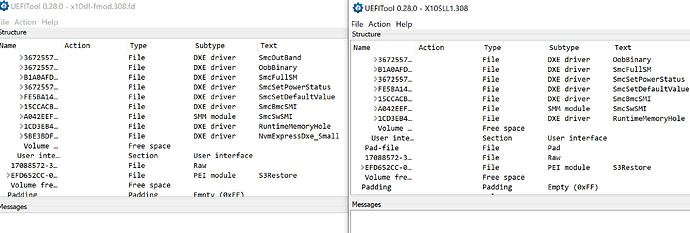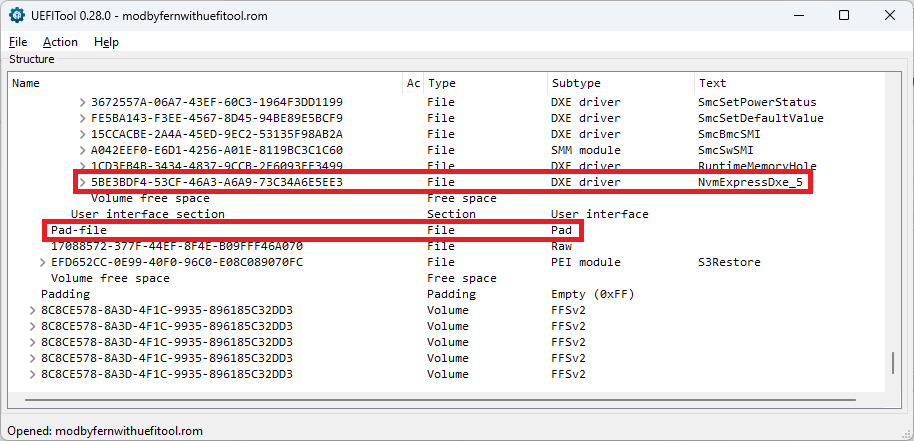So, there you go… and how about that 990… one of those ALI fake ones?
Yes, there can be crap sometimes. But in this case, it’s about the original one.
@nocodre
According to your inserted picture your system obviously has 2 NVMe SSDs running as members of an Intel RAID10 array. Is this correct?
Why did you choose this configuration? Didn’t you know about the risks of choosing a RAID array as bootable device?
Please give us some additional information about your system (OS, number and sort of disk drives).
I am having a PAD error.
I followed the instructions perfectly using the mmtool
I am using 3.4 bios version of x10sll-f supermicro board.
Using the mmtool the first nvme was too big so I used the smaller version. I did not compress it.
Then I opened up the UEFItool to compare the injection points to check for the PAD issue. I did find that while the original contained, the modded bios did not.
I am reporting this looking for help.
@wah00kid:
Welcome to the Win-Raid Forum!
To be able to help you we need the original BIOS file. Please give us a link to it.
@wah00kid
By using the UEFITool v0.28.0 I was able to get the NVMe EFI module named NvmExpressDxe_5.ffs properly inserted without touching or creating any Pad-file.
Here is the related picture:
Awesome I’ll use that tool instead of the mmtool.
Thanks so much… grrr I should have tried that.
@m11c
Since there was no reason to start a new thread about your problems trying to extract an NVMe module from the NVMe supported BIOS of another mainboard model, I have moved your request into this already existing thread, where you can get answers to some of your questions.
Who do you think is responsable for the failure?
>Here< is the requested guide you obviously were missing.
mods providing non-answers and deleting the comment pointing it out, classic.
where is the NvmExpressDxe_5.ffs from, and extracted with which tool?
i extracted nvme and ami module from x299, but didn’t work. the ami module is the same as nvme module from x99.
i’ve used mmtool for older m.2 drive with x99 modules, but doesn’t work with newer.
the one provided here works with newer, but not the old drive i have.
You obviously haven’t even read the start post of this thread.
The answer is written within Point 5. of the chapter “This is what you will need:”
As you can read there, it was our Forum member and BIOS module compiling Guru Ethaniel, who had created and optimized the offered NVMe modules himself by composing and customizing their hex code. So there has nothing been extracted by him from any existing BIOS.
Contrary to modern BIOSes, which natively contain 3 different NVMe EFI modules, Ethaniel’s NVMe modules don’t need any additionally added NVMe modules, but are nevertheless able to get the NVMe SSD bootable. The disadvantage of missing NVMe features (e.g. showing the exact name of the in-use NVMe SSD within the BIOS), is compensated by the fact, that Ethaniel’s NVMe modules, which are offered within this thread, definitely work fine with the NVMe Controller of all NVMe SSD models.
inserting the module is causing being unable to boot when enabling above 4g.
just black screen on boot.
this in turn seems to corrupt the bios, so issues persist after clear cmos.
bios settings that should be stable is crashing when trying to load OS.
i get line-item ghosting in bios, and trying to load bios settings profile causes bios to freeze.
@N00B_Master69
Why 4g decode has to do with this thread and NVMe mod?
Do we even know the “dishwasher” machine model your doing this… or is this a “Toaster” version???
Why 4g decode has to do with this thread and NVMe mod?
already said so
inserting the nvme module is the only thing changed, and now enabling that setting corrupts the bios.
Since there’s no machine model given, no stock firmware attached, no modded firmware attached, one has to assume this is just meant as a not too constructive “didn’t work” comment.
Anyway, consider the possiblity that you did something wrong when inserting the module.
Hello.
I have modified the latest version of the BIOS for the MSI H87-G43 motherboard.
Since this board does not have a backup BIOS chip and I don’t have a programmer yet, I would like to ask for a check to see if I did everything correctly.
If everything is OK, it might be useful for someone else as well.
I have attached two archives: the standard BIOS and the modified BIOS.
Thank you all for your time and attention.
PS.
Flashed this Bios, the pc rebooted at 96 percent. I used pci-e connector adapter and used m2 drive from my laptop to test.
Yes, the Bios sees the m2 drive as “Pata”, for the test I installed win10 on it, all went well and the system boots from the m2 drive.
@232tomas232
The mod seems correctly done, correct volume insertition and at first glance, no original pad absence or auto generated.
This is no assurance of a risk free operation, a situation that all users should be aware when dealing with bios mod files.
Good luck.
Yes, I flashed the Bios and everything works fine, the m2 drive also works and shows up in the Bios.
I have edited my first post and updated it.
Maybe someone will find it useful.
But I can’t upload the bios file directly to the site to my post.
Thanks.
Hi friends,
can someone help me to make a modified BIOS for Asus P8H67-V B3 to add NVMe support (bootable)?
https://www.asus.com/supportonly/p8h67-v/helpdesk_bios/
Thank you in advance,
crumly
@crumly
Welcome to the Win-Raid Forum!
Since the requested help is layed down as complete step-by-step guide within the start post of this thread, we expect, that the interested users do the required BIOS modification work themselves.
If you are unsure regarding the result of your work, feel free to ask for a check here (don‘t forget to attach the original and your modded BIOS!).
Good luck!

